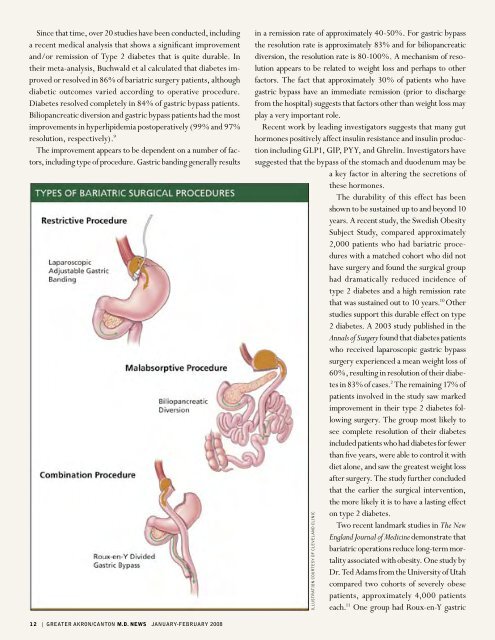Lisa Kohler, MD - AkronCantonMDNews
Lisa Kohler, MD - AkronCantonMDNews
Lisa Kohler, MD - AkronCantonMDNews
Create successful ePaper yourself
Turn your PDF publications into a flip-book with our unique Google optimized e-Paper software.
Since that time, over 20 studies have been conducted, including<br />
a recent medical analysis that shows a significant improvement<br />
and/or remission of Type 2 diabetes that is quite durable. In<br />
their meta-analysis, Buchwald et al calculated that diabetes improved<br />
or resolved in 86% of bariatric surgery patients, although<br />
diabetic outcomes varied according to operative procedure.<br />
Diabetes resolved completely in 84% of gastric bypass patients.<br />
Biliopancreatic diversion and gastric bypass patients had the most<br />
improvements in hyperlipidemia postoperatively (99% and 97%<br />
resolution, respectively). 9<br />
The improvement appears to be dependent on a number of factors,<br />
including type of procedure. Gastric banding generally results<br />
in a remission rate of approximately 40-50%. For gastric bypass<br />
the resolution rate is approximately 83% and for biliopancreatic<br />
diversion, the resolution rate is 80-100%. A mechanism of resolution<br />
appears to be related to weight loss and perhaps to other<br />
factors. The fact that approximately 30% of patients who have<br />
gastric bypass have an immediate remission (prior to discharge<br />
from the hospital) suggests that factors other than weight loss may<br />
play a very important role.<br />
Recent work by leading investigators suggests that many gut<br />
hormones positively affect insulin resistance and insulin production<br />
including GLP1, GIP, PYY, and Ghrelin. Investigators have<br />
suggested that the bypass of the stomach and duodenum may be<br />
a key factor in altering the secretions of<br />
these hormones.<br />
The durability of this effect has been<br />
shown to be sustained up to and beyond 10<br />
years. A recent study, the Swedish Obesity<br />
Subject Study, compared approximately<br />
2,000 patients who had bariatric procedures<br />
with a matched cohort who did not<br />
have surgery and found the surgical group<br />
had dramatically reduced incidence of<br />
type 2 diabetes and a high remission rate<br />
that was sustained out to 10 years. 10 Other<br />
studies support this durable effect on type<br />
2 diabetes. A 2003 study published in the<br />
Annals of Surgery found that diabetes patients<br />
who received laparoscopic gastric bypass<br />
surgery experienced a mean weight loss of<br />
60%, resulting in resolution of their diabetes<br />
in 83% of cases. 2 The remaining 17% of<br />
patients involved in the study saw marked<br />
improvement in their type 2 diabetes following<br />
surgery. The group most likely to<br />
see complete resolution of their diabetes<br />
included patients who had diabetes for fewer<br />
than five years, were able to control it with<br />
diet alone, and saw the greatest weight loss<br />
after surgery. The study further concluded<br />
that the earlier the surgical intervention,<br />
the more likely it is to have a lasting effect<br />
on type 2 diabetes.<br />
Two recent landmark studies in The New<br />
England Journal of Medicine demonstrate that<br />
bariatric operations reduce long-term mortality<br />
associated with obesity. One study by<br />
Dr. Ted Adams from the University of Utah<br />
compared two cohorts of severely obese<br />
patients, approximately 4,000 patients<br />
each. 11 One group had Roux-en-Y gastric<br />
ILLUSTRATION COURTESY OF CLEVELAND CLINIC<br />
1 2 | | GREATER AKRON/CANTON M.D. NEWS JANUARY-FEBRUARY 2008









